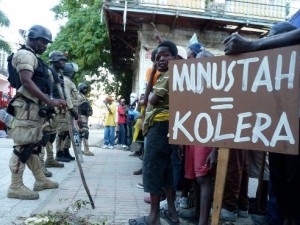by Edith M. Lederer, Associated Press.
 UNITED NATIONS (AP) — Secretary-General Ban Ki-moon told members of the U.S. Congress Friday that the United Nations is committed to helping Haiti overcome a cholera epidemic even though it is refusing to pay compensation to victims who blame U.N. peacekeepers for starting the outbreak.
UNITED NATIONS (AP) — Secretary-General Ban Ki-moon told members of the U.S. Congress Friday that the United Nations is committed to helping Haiti overcome a cholera epidemic even though it is refusing to pay compensation to victims who blame U.N. peacekeepers for starting the outbreak.
Health officials say more than 657,000 people have fallen ill and more than 8,000 people have died from cholera since it was likely introduced to Haiti by U.N. troops from Nepal in 2010. More than 30,000 people have fallen ill and 440 have died in the neighboring Dominican Republic.
Ban was responding to a May 30 letter from U.S. Rep. Maxine Waters, a California Democrat, and 18 other Congressional “friends of the people of Haiti” who expressed concern at the U.N.’s rejection of the claims by 5,000 cholera victims and their families.
The lawmakers urged the U.N. to take responsibility for introducing cholera into Haiti and take the lead in funding the Hispaniola Initiative, which requires $2.2 billion for Haiti and $70 million for the Dominican Republic over the next 10 years to improve access to clean water, develop sanitation infrastructure, and address the cholera epidemic.
“We are dismayed that the United Nations has committed only $23.5 million for this initiative,” the members of Congress said.
Ban sent separate letters to the 19 lawmakers outlining measures the United Nations has taken and supported, saying it has devoted more than $140 million to cholera treatment and prevention activities since 2010.
“These efforts have helped to decrease the rate of new infection by 90 percent since the outbreak began,” he said. “The mortality rate has been brought down to around 1 percent. Still, further progress must be made.”
He did not address the issue of responsibility for the epidemic, and he reiterated that the U.N. rejected the compensation claim in February on grounds that the world body has legal immunity from such lawsuits.
“I would like to assure you that the legal decision does not in any way diminish my personal commitment, and that of the United Nations, to do all we can to help the people of Haiti overcome the cholera epidemic,” Ban said. “Achieving this goal will not be easy, but it is possible.”
The secretary-general agreed with the lawmakers that funding is “far from sufficient” and expressed concern that “the austere fiscal climate” could affect new financial commitments from U.N. member states to combat cholera.
